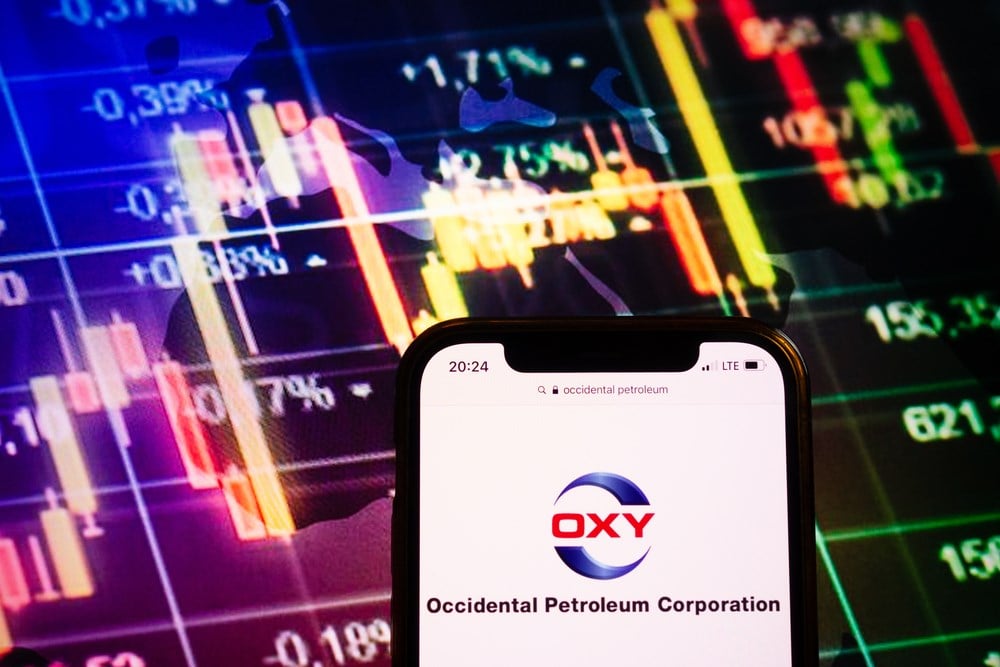
Warren Buffett’s Berkshire Hathaway Inc. (NYSE: BRK.B) is continuing to shop in the Occidental Petroleum Corp. (NYSE: OXY) aisle, adding 3.46 million shares to his position. The new purchases, valued at over $200 million, took place between May 16 and 18.
Previously, various Berkshire Hathaway entities purchased Occidental stock between May 11 and May 15, for a total of 2.2 million shares valued at $125.7 million.
Buffett’s total stake in Occidental now stands at nearly 25%.
The price at purchase is reported on an average basis. In the May 11 through May 15 filing, Berkshire Hathaway reported prices ranging from $56.7976 to $58.4611. The rose on each subsequent day.
Between May 16 and May 18, share prices ranged from $58.1144 to $58.6597. The price actually declined on May 18, allowing Berkshire Hathaway to get in at a slightly lower entry point.
Gradually Accumulating Shares
That’s an excellent example of how a large institution gradually accumulates a position in a stock. Buffett began buying shares of Occidental in 2022, and has been gradually adding to his stake.
In this case, Buffett’s buying is helping to send the price higher, or at least stabilize it. The Occidental Petroleum chart reveals solid support above a March 15 structure low of $55.51. It appears that Berkshire Hathaway is stepping in to purchase more shares without letting the price drop below that floor.
So would Buffett buy more shares at a higher price? It appears that’s happening, but it’s also important to know: Berkshire also has warrants to purchase an additional 83.9 million shares of Occidental for $59.62 apiece. The warrants were part of a 2019 deal in which Berkshire gave Occidental a $10 billion cash infusion to help finance its purchase of Anadarko.
The acquisition provided Occidental with increased oil and gas reserves, particularly in the Permian Basin, a prolific shale oil region in West Texas and Southeastern New Mexico. Occidental's decision to acquire Anadarko was part of a competitive bidding process with NYSE: CVX">Chevron Corporation (NYSE: CVX), a stock that Buffett has been paring back, although he still has significant ownership.
When To Exercise Warrants
So when might Buffett exercise the Occidental warrants? Watch for the stock to rise above that $59.62 level. It’s currently trading less than 1% below that level. It’s not necessarily the case that Buffett will pounce as soon as Occidental rises to $59.63; in fact, the higher the price rises, the more valuable the warrants become, as it means Berkshire can acquire more shares for a lower price.
As of March 31, Berkshire also owned about $9.5 billion of Occidental preferred stock, which has an 8% annual dividend. Preferred shares carry no voting rights, but they compensate investors with priority for dividends and often by paying a higher yield. The Occidental Petroleum dividend yield for common shares is 1.2%.
The outstanding warrants answer any questions about Buffett’s intention to buy more shares, but some analysts are still puzzled by his statements that he has no interest in buying the company outright.
Approval To Own 50%
In August, Berkshire got the OK from the Federal Energy Regulatory Commission to purchase as much as 50% of Occidental's common shares. That approval was necessary because when Berkshire’s warrants are exercised, its stake would exceed regulators’ 25% ownership threshold.
At the Berkshire Hathaway annual meeting in early May, Buffett said he has no plans to acquire the company outright. He emphasized something he has said before: He’s happy with the company’s current management, especially CEO Vicki Hollub, with whom he works closely.
Share Buybacks Add To Yield
Occidental increased its dividend in 2021, after slashing it in 2022. It initiated a share buyback program in 2022, for a total yield to shareholders of 7.72% in the past 12 months.
Occidental shares were up 1.85% on May 19, following news about Buffett’s purchases. However, it’s still unknown if Berkshire was continuing its buying spree; if so, any Occidental purchases would be reported within a few days, due to the company’s ownership stake.





